- Introduction
- 10 Things Doctors Should Stop Saying to Medical Coders
- #1 Stop Emailing Me All The Time
- #2 What You Code Doesn’t Match What I Wrote
- #3 You Said I Can’t Do That. Why Do You Keep Changing What You Want Me To Do?
- #4 Just Tell Me What To Write And I’ll Do It
- #5 How Come You Keep Changing The Rules?
- #6 I Didn’t Get Into Medicine To Learn Medical Codes. So Just Code Whatever You Want
- #7 What Do I Write To Get Paid?
- #8 I’m Going To Code Everything As A 99213 So I Don’t Get In Trouble
- #9 I Will Not Get Audited Because They Don’t Audit My Specialty
- #10 I’m Going To Send My Coding Overseas Because It’s Going To Save Me A Lot Of Money
- Bonus That Is The Code The EMR Told Me To Use
- Submit Your Topic Requests
Introduction
Hello everyone! It’s Live with CCO episode #85. Hey, we’re getting really close to 100. Isn’t that fun? Hey, I am so glad you’re here, too, and I’m noticing that there’s a lot of people that were waiting in the wings getting ready for this particular topic that we announced we were gonna do. We’re gonna have some fun with this and I would appreciate you letting me know if you have heard the statements before by providers or if you have heard somebody tell you, “oh did you know Dr. So and so stated this the other day to me”, that would be great. And then, if there’s any unique statements that you’ve heard from providers working with providers, I’d like to know about it because it’d be fun to put a compilation of these statements together with our CCO Lives. Don’t forget. This is our casual event. We like to have interaction with you and we really appreciate the topics that you send in. This is something that we had been waiting in the background to do for a while and thought this was the right time to present it. Let’s get straight to the topic that we had picked tonight.
10 Things Doctors Should Stop Saying to Medical Coders
10 things doctors should stop saying to medical coders. Now, in our world, coding, billing, auditing, yes, CDI, compliance, that world where we work in provider education, we’ve heard some doozies and this could be twofold. This would be great for providers to listen to to kind of have some fun. But, not only am I going to give you the statements that I’ve heard in other people have told me that they have heard but I’m also going to tell you, you know, tips on what to say to the provider when you hear this statement as well as let’s also think about why is the provider making these statements? Because we cannot just assume that you know that they’re doing this to frustrate you. That’s not the case. There is a legitimate burden or frustration that’s happening or they don’t, you know, they don’t make these statements.
Hi Carmen! How are you? Great to hear from you again. Out of New York. Carmen was a previous student out of New York. So, good to hear from you again. All right. Let’s start with number one and I’m really looking forward to hearing what you guys say. Hi, Rhonda. I’ll try to keep that eye going over there.
#1 Stop Emailing Me All The Time
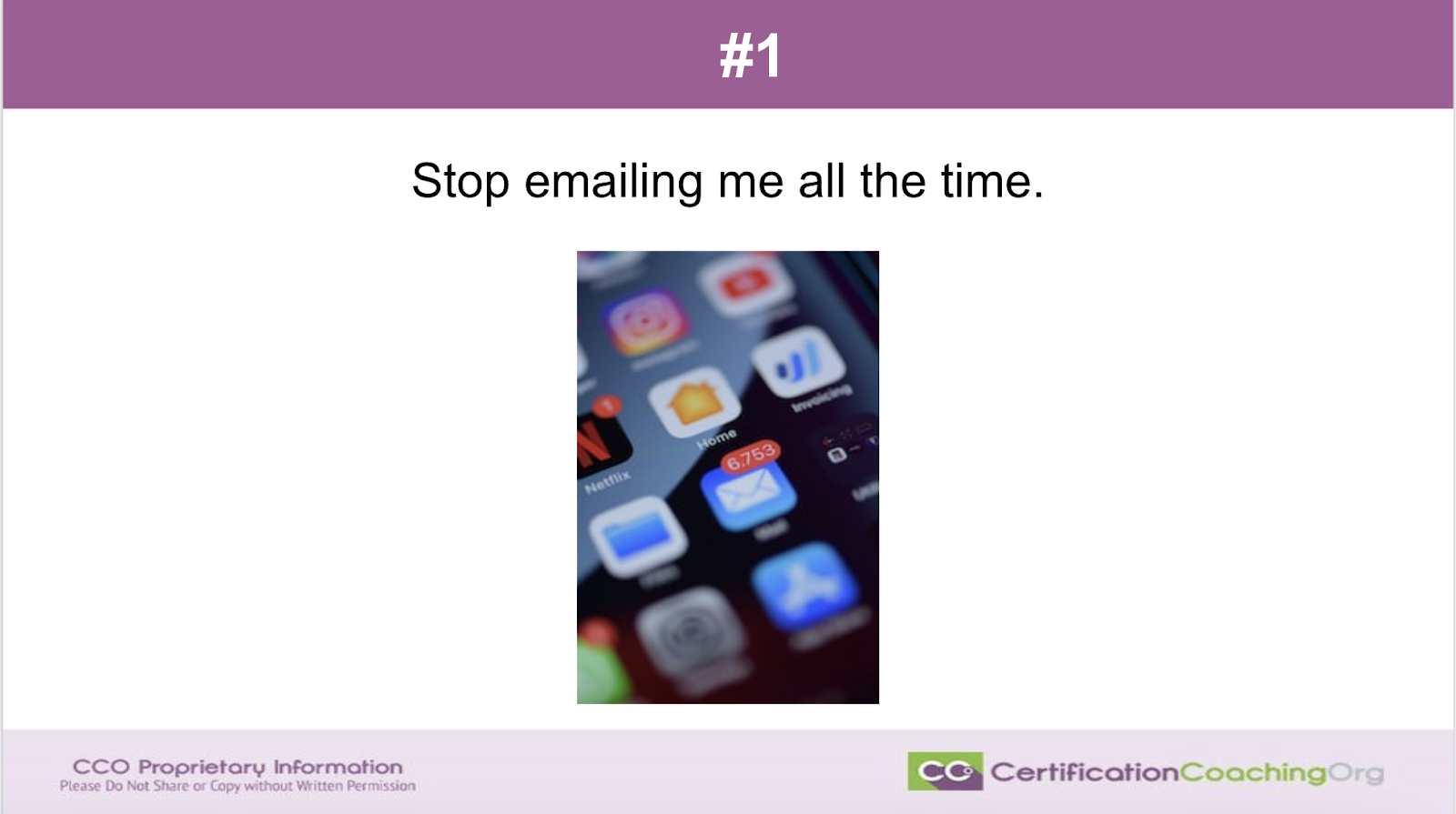
All right, number one. Stop emailing me all the time. Now, they may not have said this to your face actually, but they’re thinking it. Notice on this one. I had to grab this picture because look at 6,753 emails. We know that our providers get frustrated with queries. They do and they’re already busy. They’re having to do all of this paperwork or this documenting and stuff. They don’t have to hand write all that that they used to. But still, you know, even after they’ve seen the patients that day, they don’t just leave. They have to clean up all their emails and get in early to do their email. Sometimes when they’re having lunch, they shut the door and they’re working on their emails and messages and projects that they’re a part of during that time, too.
So when they are in, they walk in the office in the morning, they are probably already having accessed messages and and trying to take care of things before they walk in and during their breaks and lunch and when they walk out, they’re not done. Being a provider isn’t something that you just turn the switch off. And the emails that we send them, it’s important that we make sure that they’re short, precise, gets, you know, get to the point and doesn’t need all that fodder. Don’t be emailing like you’re carrying on a conversation. They just need to know what you need from me and then give me easy options to answer you. I don’t want to have to reply in three paragraphs.
Now, if you don’t already have a query format for your office, then you need to have one. Most larger entities and organizations will have a standard. And again, why do we query the providers? Because we need clarification on something. So, there are Laws surrounding a proper query. We have to be very careful. If you want more information about a proper query we have that both in the CCO club and we have some notes on that on the YouTube channels.
However, just keep in mind that you can’t say, hey, Dr. Feelgood does your patient, can I, you know, code emphysema for Mr. Jones because I saw it on that CT scan when you name checked for, you know, something on the liver? The providers said that you can’t do that. You have to have a format which I’m not going to get into that now because again, they’re specific ways to do it and we’ve done it before. When they tell you that they’re being bombarded and they’re frustrated with all of the emails that they’re given then that tells you that we need to figure out a fix for that situation. One of the number one things and burnout for providers is their emails. Hundreds of emails coming in.
So, most EMR systems, they’ll have a query format or they have a way for them to look at their queries. Figure out what your office has and work together with the provider. Sit down with them and say I know this is a burden. Let’s come up with a proper query that will allow me to give you the information and then you respond and if it has to be what I call staccato, very little pinpoint do-do-do-do, let’s make that happen and know that I will not send you an email unless it something that I need information on and I’ll put time frames whatever you have to do. So, stop emailing me all the time. How many of you guys have heard that or I’m not going to answer my emails? I’ve heard him say that, too. It’s like I’ve got too many. I’m not gonna answer like, you know, three days ago or since you have a query on, you know, Mr. Jones. I need clarification before we can send that bill out and well, I’m not looking at my emails. Okay. Very good. Let’s move on to number two.
#2 What You Code Doesn’t Match What I Wrote
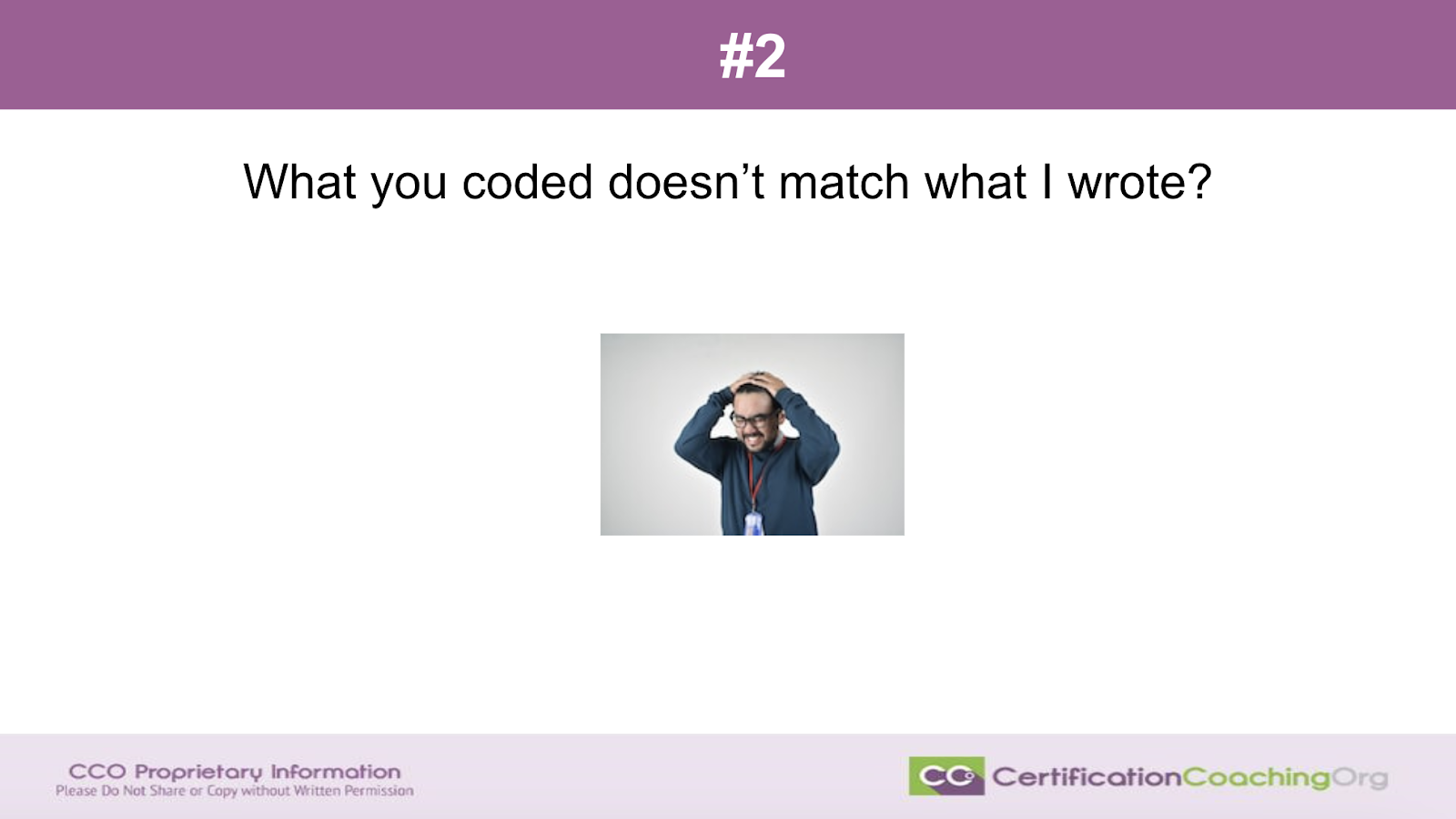
Number two. What you code doesn’t match what I wrote. Now, this becomes a problem because I know that when they go back and the provider looks at the documentation and if they have a list of the codes and everything that was billed out with that and just recently I was talking to some providers and there was a really big hoopla about being down-coded. The providers were really frustrated at this ACO because they were, they said the coding group that was doing all their coding kept down coding what they were doing. Well, you know, I had talked to the director and they said actually what was happening is the documentation didn’t support what they had picked and so of course the coders went in and cleaned it up and it ended up resulting in a lot of down coding. But, that’s all that the providers saw a lack of money that they thought they were going to get because they had picked an E&M. But, they didn’t have the documentation and support for that E&M and rightly so the coder came in and lowered it.
Here, we have miscommunication. We have frustration on both sides and the director had stated that, you know, we had been telling the providers that they were probably doing the work but the documentation didn’t support the level for that encounter and so therefore the coders had to pick a different code. In that scenario the providers were looking at the money going down and even though they had been told what was causing this discrepancy, it wasn’t clicking for them or they were in denial or they wanted an outlet for their frustration. So, they picked the coders and they ended up firing that coding group.
Well, this had been in the past and now that they’re having some issues again, there is tension between who are we getting to do the coding and the one provider said I do it all by myself, I do all the coding. But he wasn’t trained to do the coding and he doesn’t understand why there’s discrepancy again and why it’s a problem. Because again, he’s upcoding and you know, you get the point. So, whenever you have a provider that tells you, hey, this isn’t matching, that’s the time for education on both parties. Both the provider educating the coder what their intent is and the coder educating the provider and saying, this is your intent. However, this is what is documented. So yes, you did A, B and C. But if it’s not, if B is left out of the documentation, then I don’t get to code for B. And so, having that communication, open communication and good relationship will help with that.
Renee says our providers have 10 business days to reply to queries or to provide missing or incomplete documentation or Hospital. Admin suspends them. See, the value there is that what Renee has is the support of working for a large entity. Whereas a lot of these small groups or ACOs, they don’t have that and they would benefit from having a policy like that in. Now if it’s an ACO, you’re not going to get that, you know, they’re gonna fight because the providers are the ones that run the ACO. However, if you can show them the benefit of saying hey, we’ve got a 10-day time period and get the money guys in there, too and why we need replies on these particular queries etc, then everybody sits down at the table and says, here’s our pain points. Here’s how we can fix them. Do we all agree? Okay, write it down in the compliance notebook and let’s move forward and see what type of improvements that we can make together.
So, yes. Very, very good point and just because, you know, you say that you’re going to work together and everything then you have an old Dr. Slaughter that’s been practicing for 40 years and doing the same thing for the past 40 years. He can be quite cantankerous for change. I think we’ll be able to use Dr. Slaughter as a reference again here in a moment or two. So, number 2, why you, you know, what you code? It doesn’t match what I wrote. Mmm what you wrote actually doesn’t match what you wanted it to be or this is what I need or I’ve got another example coming up where we could say that’s like this one number two, where what the provider picked in the code doesn’t match what went out because of the EMR system. So, we’ll get to that one in a moment.
#3 You Said I Can’t Do That. Why Do You Keep Changing What You Want Me To Do?

Here’s a fun one. You said I can’t do that. Why do you keep changing what you want me to do. Now, again lack of communication. I had this scenario just the other day where the provider who had been practicing for a long time had stated, you know, you guys, it wasn’t me because this was a long time ago. But again, we’re all lumped in together. You guys used to tell me all the time that I was documenting everything that was wrong with the patient and that it was too much information. I was only allowed to document why I was saying that patient that day. Well, yes, that’s kind of the way it was back then, you know, and that it’s kind of a broad statement. I mean, but, now the E&M is based on medical decision making and if your documentation, your medical decision making was affected by any of these chronic conditions that are listed on the problem list, then you need to document that and it does increase the leveling for the E&M.
So now, we do want you to talk about the patient’s hypertension or if they are being seen for their prostate cancer follow up for the prostate cancer then I want to know all of those chronic conditions that make you consider, oh can I put them on this medication because they’re taking prostate cancer medication, etc. Diabetes. If, you know, what is not being affected by diabetes, it’s almost better to state this organ system is still not ,you know, is so far doing well and not being affected by diabetes, but everything else is. We’ll list that out and the only exception that I could ever think of would be a patient that comes in to have cerumen, you know. Cleaned out of their ears and otherwise be kind of hard pressed for these chronic conditions having not been a part of the medical decision making.
Most often when you break it down, we have to remind our providers that you see these patients and these diagnoses and these challenges every day. You almost become nose blind to the complexity and severity that is your patient because it’s so common to you, but from the outside looking in, it actually is a complex patient. Your medical decision making is elevated due to, you know, ABC. And therefore, you need to document that but just because it’s routine for you,you know, CMS doesn’t feel that it is. And so, we want to make sure that you get credit for the work that you’re doing and that your medical decision making is on, you know, on paper and we can show the complexity and severity of that patient population that you’re dealing with. Yes, we have that problem. They bill a lot of 99285. That’s right, Alanda. That is so right.
#4 Just Tell Me What To Write And I’ll Do It
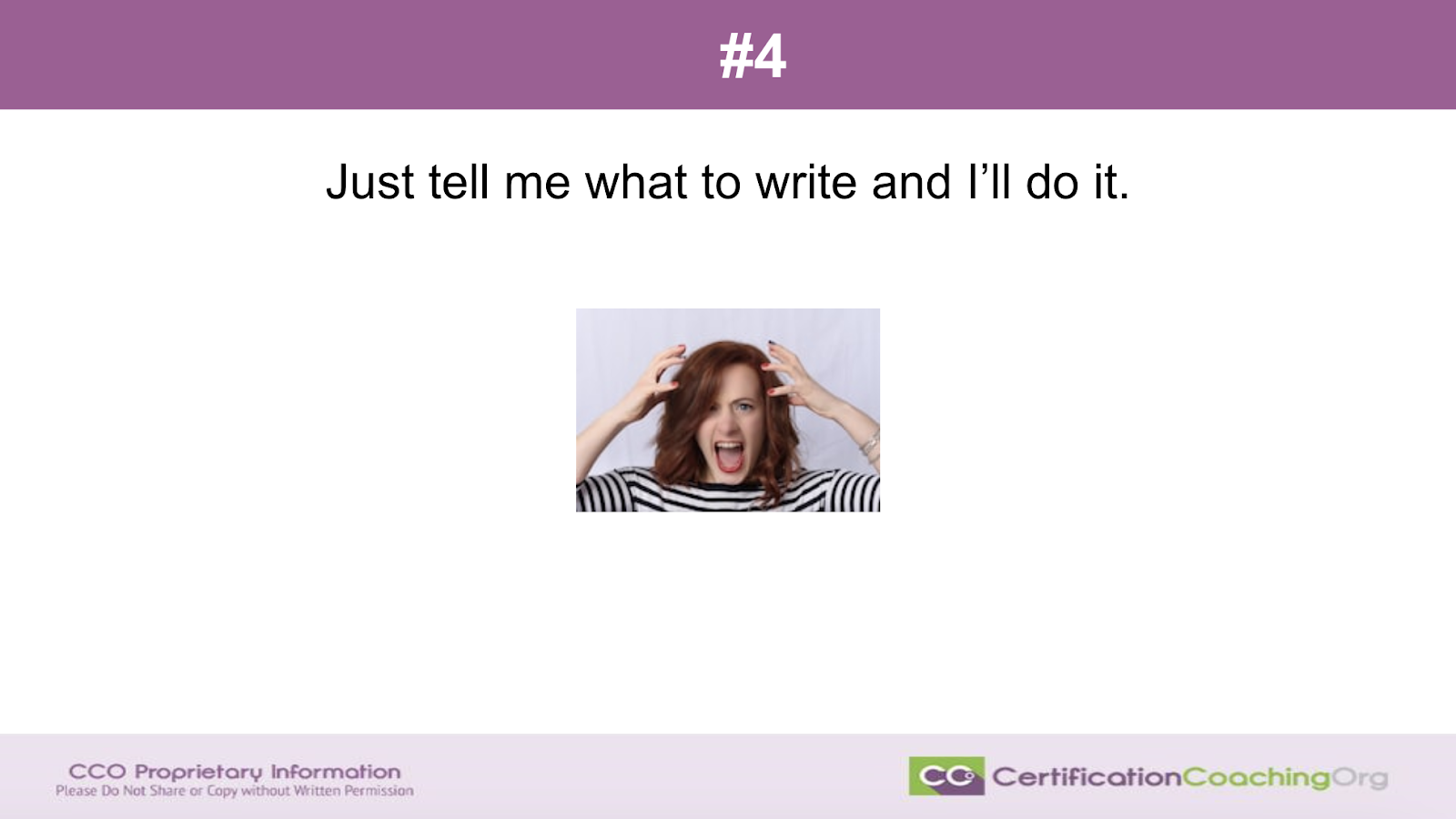
Let’s move on to number #4. Just tell me what to write and I’ll do it. How many of you guys have heard this? You know and it’s usually I tried to figure, I tried to find and this is supposed to be the provider not the coder. This picture, I’ve seen them. Just raise their hands in the air. Just just tell me what to write and I’ll do it. No, they can’t do that. But why would they say that because of their frustration? They don’t want to have to think about the code set. They are already burdened with everything else that’s on their plate. And so when we are bombarding them with emails, we’re not giving them queries that are quick, easy to follow and giving them all the information that they need in an email. So. they don’t have to go look up 45 pieces of documentation to confirm whether that patient truly is a CKD patient or not. You know, you’ve got the information right there in front of them or dates or links for them to check a lab value as well as stating, you know, this, you know, proper queries. Then it’s going to make them feel more confident in your ability to do your job as well as leave the burden that it entails having to answer these questions all the time.
I know that by the time they get to this point because they know that this statement is, you know, inappropriate. They would hit their max of frustration and that is going to be problematic for the entire office. So once they get to this point, then you’re gonna lose that relationship that you’ve been trying to build and every time they’re walking down the hall and they see you step into the hall, they’re gonna turn around and go the other way because you’re the source of their frustration and we don’t want that ever to happen. We want them to know that you’ve partnered with them. What is your job? Your job is to translate their documentation into a code set.
And so therefore we need to be on the same page all the time and the best way to do that is to have good communication in the office. Have routine meetings with them. Maybe one day a week just to go over any changes that are in the code set or something that you are starting to see happen historically that could be problematic and keep it short and sweet 15 minutes a week to go over those details and then most likely you won’t have at level of frustration where they throw their hands up in the air and they’re done. It’s kind of the way I like to call it. Their done moment.
#5 How Come You Keep Changing The Rules?
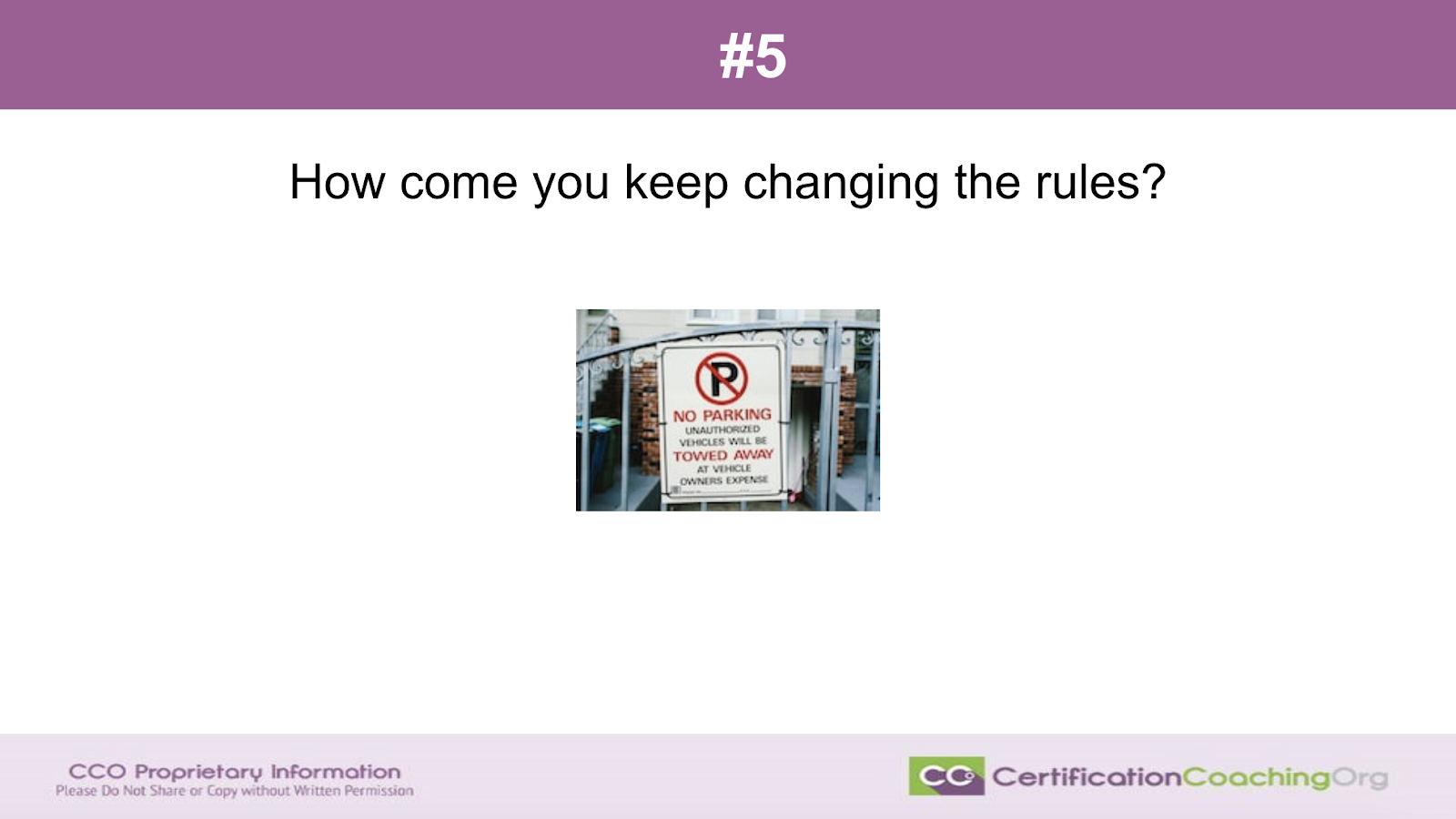
Five, how come you keep changing the rules? Well, again, the provider that I was telling you about used to get on to me all the time when I would list I would document too much and now you’re telling me that I was since I stopped doing that now I have to start doing again? What, you know, he literally said what rule do you want me to follow? You know, why? Why are you keep changing this and you know, it’s not me. It is the powers that be in our world that have changed the way E&M is done. And again, this particular provider that made the statement is one of the ones that is the poorest in his documentation. That he’s always having them harp at him. He’s always almost always at a hundred percent review and and he’s been in medicine for a very long time.
So, you put all of that together and he’s a great fellow. Great doctor. Even a sub-specialist. Sees a lot of patients. His patients love him. He’s very thorough but he came into the EMR system kicking and screaming. And then on top of that,the rules and the code started changing. He experienced going from 9 to 10 then E&M leveling was a nightmare. He was part of the group that had let go their coding department because they were down coding them. You know, he was still pretty raw about that. And what does that tell you? It’s you again. Number one thing we keep saying tonight is the lack of communication. He doesn’t want to know all the business side. He wants to know as much of the business side that he has to to make sure that he can keep the lights on and he, you know, can keep his practice going and yet he doesn’t want to have to worry about when OIG is going to check, you know, these particular scenarios or CMS decides to make changes or you know we go. Well, we went from 9 to 10. Can you imagine what it’s going to be like when we tell him that we’re switching to ICD 11 in the next few years and that everything will go even more electronic than it was before.
So, how come you keep changing the rules. We need to again not burden them with all of the unnecessary information that is happening. But if you do those little 15-minute meetings once a week to kind of highlight even if it’s just you walking by their office and giving them a paper that’s done attractively simple information staccato, hey by the way CMS has released this or I saw in the last audit that we did that there’s a prevalence of missed old demise and and we’re doing this to flag those for you. So on and so forth. That will be helpful and will help with the communication.
Renee says my reply is just to tell me the story of what is going on with the patient. What treatment options did you discuss? What other conditions are you concerned about while treating the current condition? That last statement is one that I highlight a lot as well with providers is what are your concerns because that stuff in your brain, but we’re not getting them out of your little gray cells and on to, you know, the paper and that truly shows medical decision making. That elevation of, you know, my patients had depression for over six months now. We’ve tried two medications. They’re not working. My concern is that if we switch to another medication, you know, XYZ could result or that we’re going to have to elevate to further testing that maybe this is a result of something else that we haven’t been able to figure out yet, you know, etc, or that we’ve gone through four medications to lower this patient’s hypertension and the patient can’t tolerate anything. Everything’s making them sick and it’s significant signs and symptoms that, you know, we’re having to switch and they’ve already got a lot of allergies. So my concern is, you know, we’re gonna run out of options.
I remember it even for my son who has epilepsy. Every year, he would go through a growth spurt and his medication. He would start having seizures again on a regular basis because he would outgrow his dose and then by the time he’d maxed out and was on the adult dose of a particular medication. It was determined. Hey, this isn’t working anymore. What’s the next medication to try? And therefore a couple years, it was kind of scary because we tried everything and we even started trying combinations to see if they would control them and it wasn’t and then again as he was getting older we thought you know, is he gonna stop growing? Yeah, what’s gonna happen? But, they did find a medication that worked and it worked for a few years and was a game changer because it was a new medication and then it started again and then it was a combination of drugs.
So during the time, his pediatric neurologist was stating his concerns in the documentation. My concern is that duh-duh-duh-duh and it was what we had discussed and and so that was helpful for as a parent of the child as you know on the patient side seeing that in the documentation, but it also elevated the medical decision making as, you know, he was an intractable epileptic at that point and his medical decision making was going higher at that time. So, you know, we want to see it all and paper. Would you do a video on how to increase your coding speed? Oh, yeah. We got topic requests. We’ll run back to this. Thanks for bringing up that point. We just did one actually, Tuesday.
#6 I Didn’t Get Into Medicine To Learn Medical Codes. So Just Code Whatever You Want
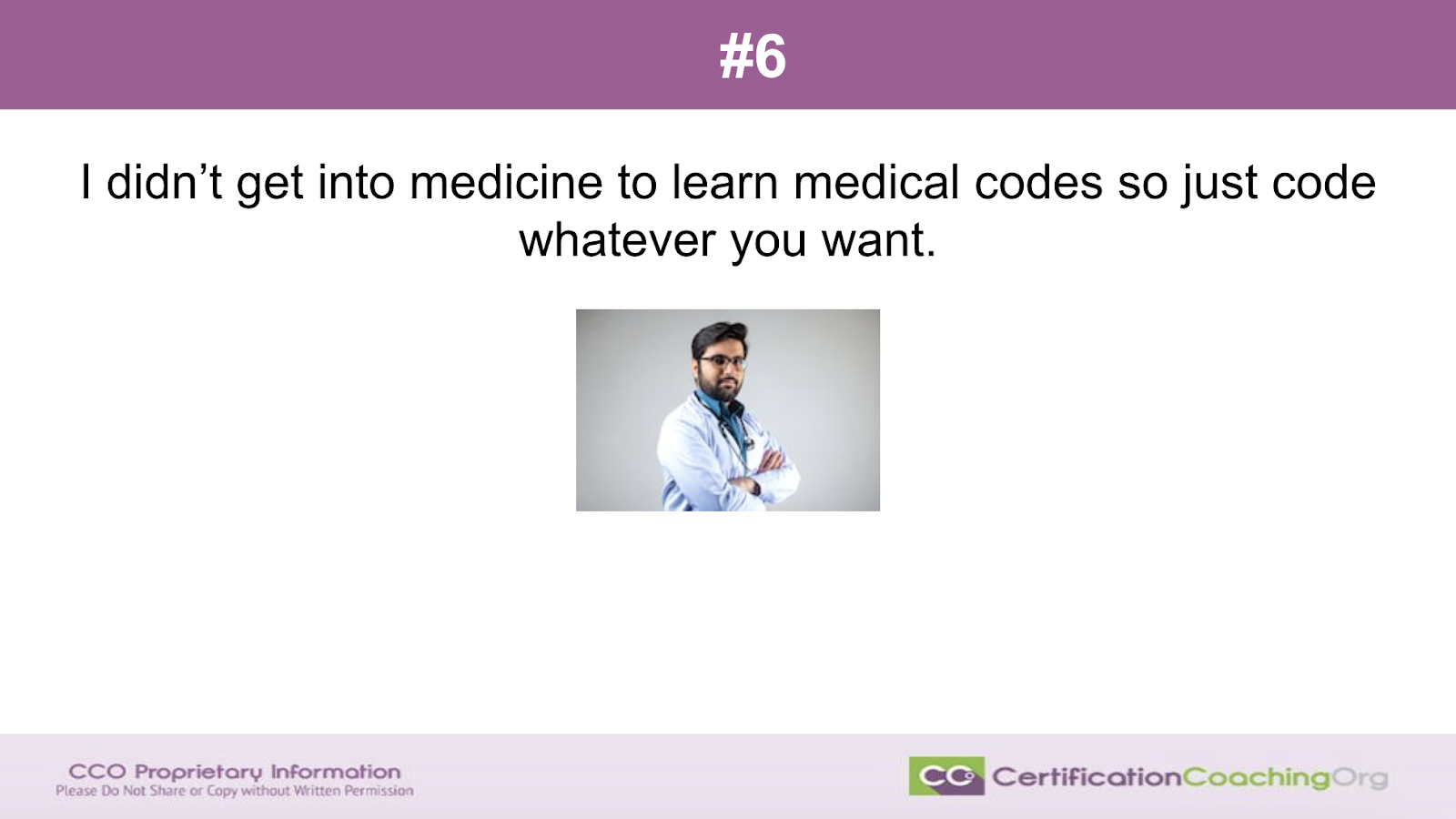
All right moving on to number six. I didn’t get into medicine to learn medical codes. So just, you know, code whatever you want. All right, the red flag starts going, you know, waving the bells are going ding ding ding ding. Stop. Stop. Don’t say what, don’t say that anymore. You know, the bad guys in black are probably listening. No, but it’s true. Doctors and providers did not get into medicine to have to deal with the code set. That’s not why they did it. Now, every year, I keep thinking that I’m going to be able to get into some Med schools and that’s one of my dreams to get into some Med schools and start educating the providers before they graduate. So, this is not such a burden to them. Because even when they do their internships, they’re not talked to. The codes aren’t talked about. They’re not having to do that. They’re still learning their specialty and they’re not forced to pick codes. The other doctors are doing that, you know, the ones that are supervising them.
So again when they finally get out and start practicing, this is a big slap in the face to have to talk and listen to people like me telling them everything that they’re doing wrong in their documentation or what they were told on how to document is not going to be acceptable in the real world. You know, hopefully they had really good mentors and their internships that will help them. But, how often do we have those simple mistakes like my patient has a history of, you know, diabetes, hyperlipidemia and prostate cancer? Do they really have a history of those things or are they seen for you to treat those things, you know, little stuff like that that becomes very problematic in the real world?
And again, what does that fall back on? Communication. Finding a way to build that relationship with the provider so that they’re comfortable enough to ask you questions that you give them the training or the ability to not memorize codes but to see if something doesn’t seem right when they look at the descriptions or that they remember. Hey, I think that she told me that if I use this code or if my patient has this diagnosis, then I’m gonna have, to also that’s going to be a two code situation. I’m gonna have to go find that other code, you know, so I’m getting there on. Flag that for them to look at or I’m going to go find my note or if even better if you give them those little flashcards and put them on a ring, so, of any specialty they can keep that in their pocket and flip that out and say oh that’s right, hypertension. Isn’t I10 when the patient also has CKD? It’s I12, you know, something and then they can type that in. It’s like, oh, yeah, there it is. That’s what she told me.
So, again communicating built in the relationship and letting them know about the common codes that they’re seeing in their patient population, right? Where you know, if they don’t have any patients that have epilepsy right now, then don’t be force feeding them information on, you know, coding epilepsy. If they have a high prevalence of diabetes in their patient population, then you’re drilling in, hey, these are the complications. This is what I need to know in your documentation to get to the highest specificity to translate for you, etc. Moving on we’re making great time guys.
#7 What Do I Write To Get Paid?
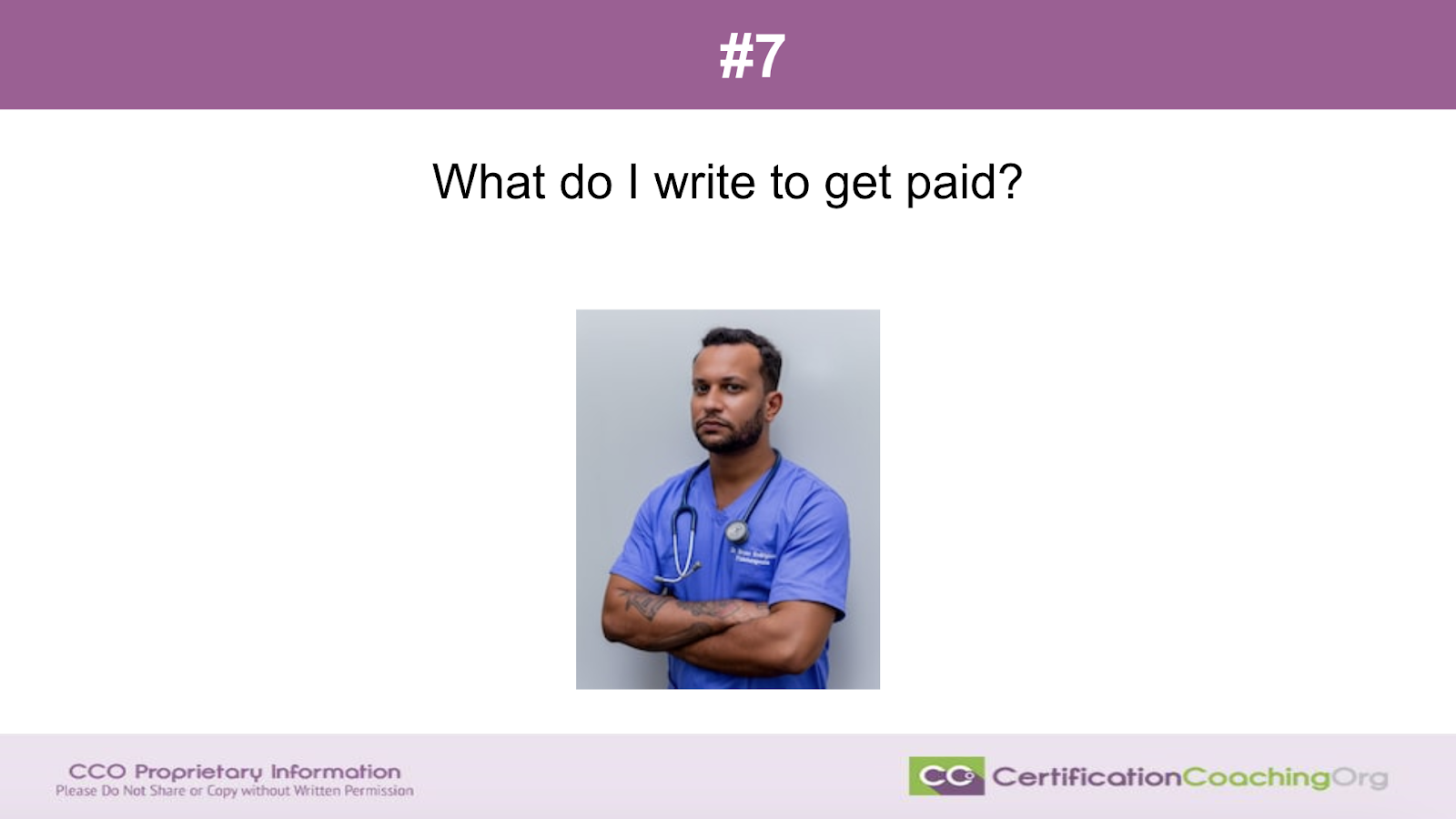
Seven. How many of you guys have heard this? What do I write to get paid? Um, that should make the sirens go off right in your little Spidey senses, coding senses go ding ding ding. Warning, warning. No, we never talk about the money. Even though I know that’s what they’re thinking and they are rightly so should be concerned about the money that’s coming in. But, that is a huge red flag. It isn’t about the money. Our focus is documentation, treating the patient and getting reimbursed properly for the medical decision making. Everything that you’re doing to the patient as well as the complexity of severity of the patient. Then that’s based on the ICD-10 codes and showing the complexity of the patient again will be those diagnoses. However, the E&Ms and the procedure codes have to be done correctly as well.
If you have really good coders in the office, they will be able to capture the codes at the highest specificity as well. But, it’s not a matter. What do I have to write so that I can maximize my reimbursement? No, what did you do to the patient? How complex was a patient? You know, what were your concerns like Renee mentioned that raises that complexity. Carmen says true. Yeah, what do I write to get paid? No. Yeah, that isn’t a matter of. Our focus should never be on money. Although, it has to be because we want to get quality toilet paper for the office. We want to keep the lights on so that we can still see the patients. But, you also want to get the best contracts that you can with Medicare and Medicaid and so on so that you are reimbursed at full capacity with them.
And, how do you do that? You make sure that they’re not losing money and that the patient isn’t more complex then what you’re indicating by the codes that you’re sending in for your documentation. You’re capturing everybody at the highest level so that there’s no surprises to them. And therefore, you guys everybody is working as a team. Renee goes on to say I’ve had them ask, well what diagnosis codes does cover this lab procedure? Yes, and and I can understand that, too. They get really really confused, don’t they about that and some things aren’t paid. But, we want to switch their brain into thinking that hey I need you know, I need to do these tests. And they can say. am I going to get reimbursed for these or not?
Well, what is your patient? You know, what’s your diagnoses and stuff in there? It’s not that you’re tweaking. It’s just that you’re making sure that what is documented validates those labs and procedures. It, you know, they do come in. The men in black do come in and get paid to find mistakes and there is a peer of mine that had been working with the provider who didn’t use an EMR system, wrote down everything and he was a high level specialist and I won’t even mention the specialty but the the problem was he just ordered labs, Because all of his patients were at a high level of complexity because that was his job but nothing in the documentation validated it. He just ordered all these labs. And yes because of what this patient had it was okay, you know, I mean, I won’t say it was okay. It was valid in his mind and yes other providers would do it, but he didn’t write anything to state that. He would just say, well the patient had X. So. therefore I want all these labs.
Well, these were really expensive labs. But that’s all he wrote. He didn’t justify why these labs were needed. The diagnosis alone wasn’t going to to justify it. And so it was a problem and Medicare booted them out after a while because you can’t go back and prove something years later. Just because you wrote the diagnosis in order, you know, ten labs and you kept ordering them. Yeah, you needed that information, but it you never told us why and so again that was a problem and it was another provider that had been doing this for so long that had gone to hand, you know, handwritten nose went into kicking, screaming. He didn’t even do EMRs. He still didn’t do EMRs. Still did everything handwritten and they got permissio,n you can go in and get permission for some of that stuff on the federal level and state level, but it still wasn’t enough to just state diagnosis. Nothing else. 10 labs and I know you guys know what I’m talking at. So, when the provider says what do I write to get paid? That’s another symbol or a sign that one, they’re either frustrated because they aren’t understanding the process or, you know, very few providers get into medicine to get rich. That’s not their goal.
Their statistics out there that’s a very low percentage of people that go into medicine for that reason. There are some out there. However, my thought is if I have a provider ask me that then that tells me they’ve got concerns. They’re worried. What are they worried about? Because they don’t understand the system and they don’t trust you or whoever’s been working with them. They’re one step away from throwing their hands up and that next thing, you know, just what do you want me to write? You know and so again, they feel the burden that their name is on everything and they’re the ones that’s head goes on the chopping block. Another thing that happens to them all these horror stories after they get out on their own to start practicing medicine, that stuff they don’t tell you in medical school and then you have people like me show up and then we’re reality check, you know, and again, they just want to practice medicine.
So, you know don’t gasp when they say this to get to the root cause of why they want to know what they need to write to get paid.
#8 I’m Going To Code Everything As A 99213 So I Don’t Get In Trouble
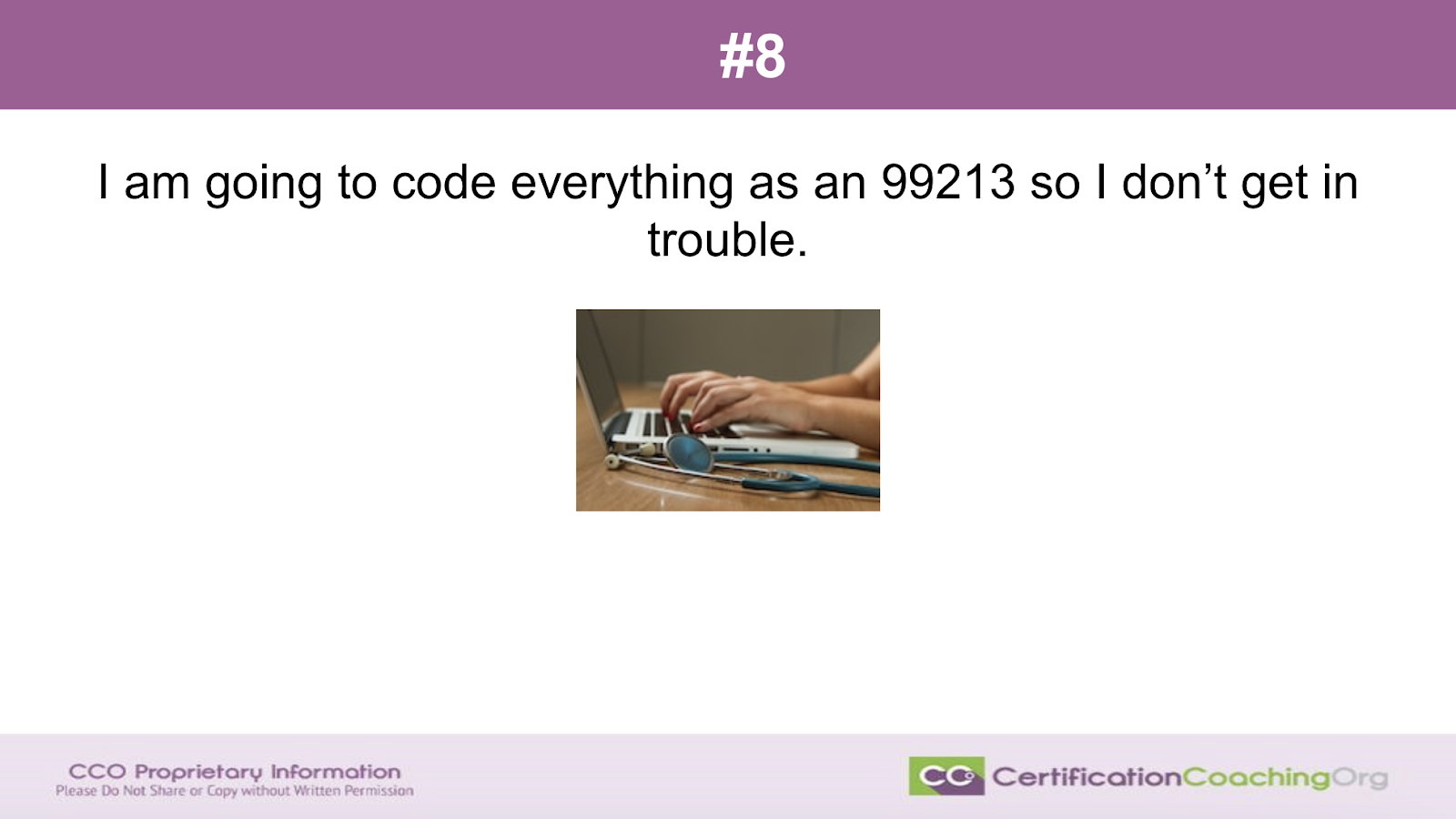
Eight. I’m going to code everything as a 99213 so I don’t get in trouble. I know you guys have heard that. I know you guys have seen it and what do we know about that? Huge red flag again. Not every patient you see is a 99213. Not and that doesn’t mean they’re a five. But, that also doesn’t mean there are two. The fact is they can track in your community. How many 99213s are built on average for the population that you live in, that practices in? I could go do that because that’s all captured data that’s free of the public. You just have to have the right software to do it.
And so, when that happens again, it’s usually a provider that has had somebody get in trouble or have heard about people getting in trouble. And so, they just want to play it safe and I go back to them and they just want to practice medicine. They’re not going to make any waves. They’ll just figure everything else will even out and it’ll be okay in the long run. But it doesn’t. That is worse even because if everybody’s a 99213, the people, the men in black that get paid to find mistakes, they are going to say okay obviously this person doesn’t know what they’re doing. And, statistics show that only 30% of the patients in this town out of all of his peers are 99213s. Because, you know, diabetes is so prevalent in this community for another reason.
So let’s see, Carmen says Medicare medical billers and coders must stay in communication with the doctors at all times. Yes, they have. They have to be friends. Now, they don’t have to be like, you know, beer buddies or anything but they have to have a friendly communication relationship of trust and know that each of them can learn from the other along the way. So, when they say I’m going to code everything in 99213. You should say stop right there. No, just zip. It. Don’t say anything else. That’s a problem because it is going to flag an audit.
Instead, let’s go ahead and go over the new rules of what is a 99213. What’s a 4 and a 5? And now, with the E&M changes you can say great news. It’s all about medical decision making. It’s not all that leveling and tipping, ticking off boxes and stuff that it used to be. It is just the way you think is the way it’s done now. And this is how a quick little sheet will allow you to see what you can say. Okay. Did I do this? Did I do this? Is it a 1 chronic condition or is it 2, you know type thing and there’s they’ve made those real short and precise now.
You can share that with them in your 15 minute meeting and say, you know what, I’m gonna do? I’m gonna take a group of your patients for a week and I’m gonna follow behind you in the documentation and immediately let you know if you up-coded or down-coded yourself and why. And then, I’ll just make a little graph for you as well as some notes as to why it was more or why it was less and you’ll have confidence in picking the correct E&M after we practice this a little bit but absolutely do not use one code across the board even it’s a low code. You are not going to get reimbursed for the work that you’re doing. And, you’re going to have all of those people looking for mistakes knocking on your door because of it. It may not happen overnight, but they will find you.
Diane says, I don’t even know who does our billing and neither do the doctors. Okay, that’s a problem. You should know. You should absolutely know how to find out and make sure that they are doing a good job. Not only should we audit the doctors. We should audit the coders as well. Some are better than others, some have bad days, you know and rules and guidelines change and we want to make sure they’re educated and staying on top of it of what’s happening as well.
#9 I Will Not Get Audited Because They Don’t Audit My Specialty
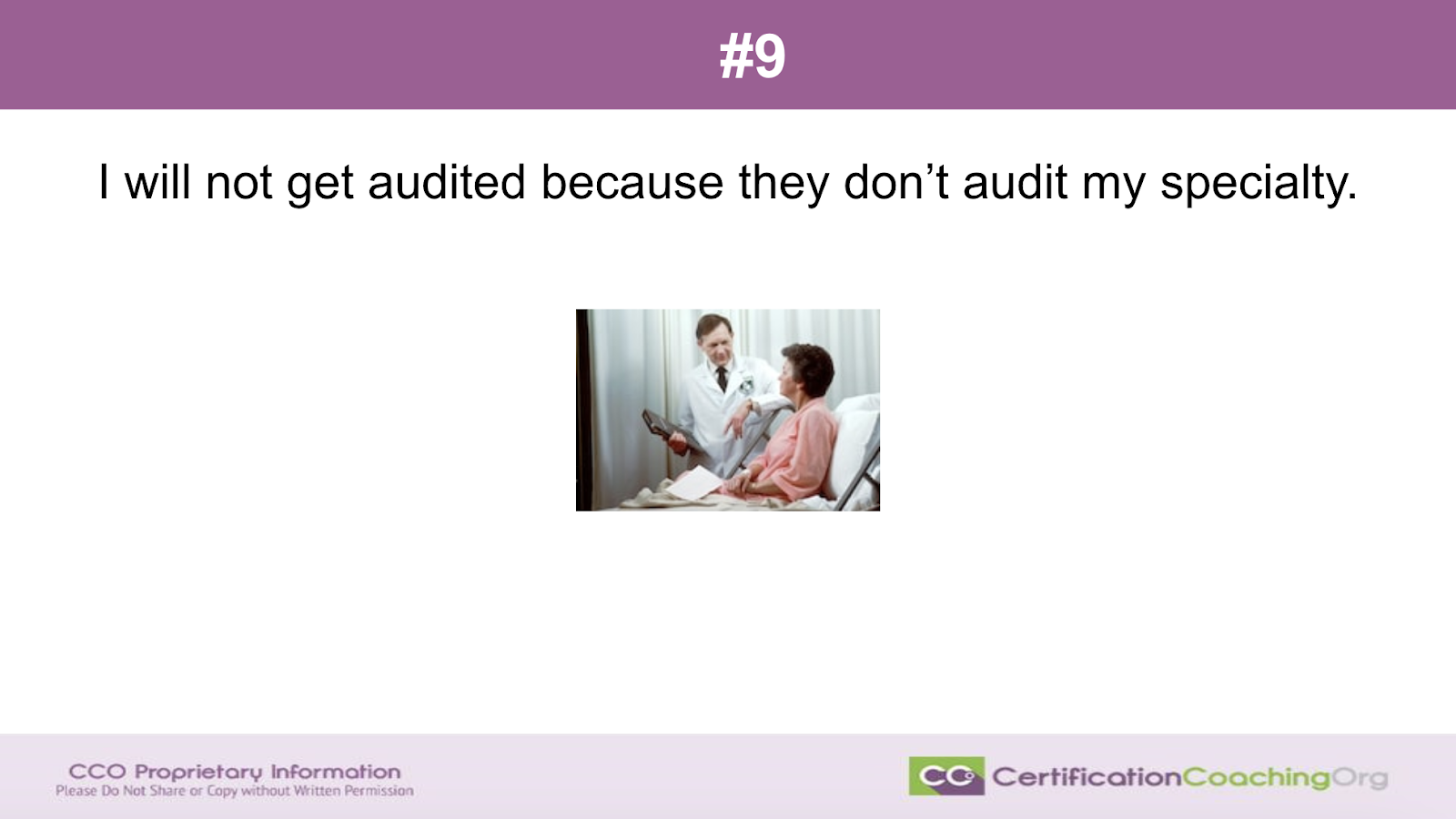
Moving on to nine. We’re almost done, guys. Are we having fun yet? I appreciate you joining us. In the comments that you made, here’s a good one. I will not get audited because they don’t audit my specialty. You hear this a lot by pediatricians. Mmm. They don’t care about us. They just care about Medicare fraud and I don’t treat Medicare patients. No. First of all, there are some patients on disability that get Medicaid,Medicare that are pediatric age then on top of that how many of your patients are Medicare, Medicaid Medicaid? A lot probably and just because they’re on the state level versus the federal level, they have men in black as well that get paid to find mistakes. Their fraud and abuse is so prevalent.
Before it was made in Medicare and Medicaid is federally funded as well as state funded. In fact after the Affordable Care Act was fully implemented, it was implemented in the final I think level was 2016. Then ultimately just about every payer had Federal funding of some type and if they’re giving out money, they’re tracking it. They have the right to go in and audit and find out where their money is going and if it’s being abused. So, don’t ever say that your specialty isn’t being audited. I know for a fact that they look for outliers, especially with modifiers like modifier 25. Who do you think has a lot of modifier 25 usage? Usually above normal in even well, in their peers could have yeah, how do I want to say this? Within the peers they look at all of the specialists with the same specialty and then they say well across your peers you’re using this code, you know 20 times more than what everybody else does. And so that makes you an outlier. Well, modifier 25 gets used and tracked a lot because it pays out more.
Podiatrists because how often do you go in and see the podiatrist? Even the diabetics. If they have to take care of something with your foot, they’re not going to make you leave and come back another time to do the procedure. They’re going to do it right there. And so, a lot of people have to travel to go see the podiatrist. There’s not one on every corner like there is with pediatricians and family medicine or now orthopedists and stuff. So, they’re just not as common and so they use modifier 25 a lot and rightly so. However, that means they’re flagged and there’s a lot of frustration because of that. But pediatricians, everybody gets audited. In fact, I pulled up a New Jersey pediatrician to settle the case. Let’s see.
Renee says yeah, I think so. Think again doc. Family Practice. Ashley says, I know this may not be on the specific topic. But do you have a video on how to know which code should be coded first? Oh, yeah. I’m in school and still learning but have not seen many of the videos on this topic. Yes, I do. It’s called sequencing and we’ll get that information to you. So, I’m going to, I don’t know. I don’t think, no, it won’t let me pull this article over because of the way I’ve got it set up but this is an OIG article. That and oh I could. I could put it in the chat for oh for Jesus if he wants to post it, I guess. He could post that. But what they did, it’s a pediatrician and they paid in, let’s see 300, they settled for a $336,298.52 settlement agreement with OIG.
The settlement agreement resolves allegation that this provider knowingly presented to Medicaid through certain and the particular State, Medicaid management Care Organization or the MCO claims for items or services that she knew or here’s the kicker or should have known because the law of
faith we’re not provided as claimed and we’re false and fraudulent. So, they stated that they submitted or caused to be submitted claims for items and services provided the beneficiaries blah blah blah resubmission of previously denied for items and services and submitted or caused to be submitted claims for items or Services provided to Medicaid beneficiaries enrolled blah blah.
So again, you think that OIG doesn’t go after pediatricians, they do. I can’t remember how many there were. I think it was Medicare. They had stated that Medicare has like three trillion and fraud and abuse in a year and Medicaid is probably right with that, too. So yeah. We got number 10 next so don’t ever think that you won’t be audited. They audit the little practices as well as the big practices and why do they audit? When they see codes repeated like 99213 and nothing else coded. And the red flag, honey.
#10 I’m Going To Send My Coding Overseas Because It’s Going To Save Me A Lot Of Money
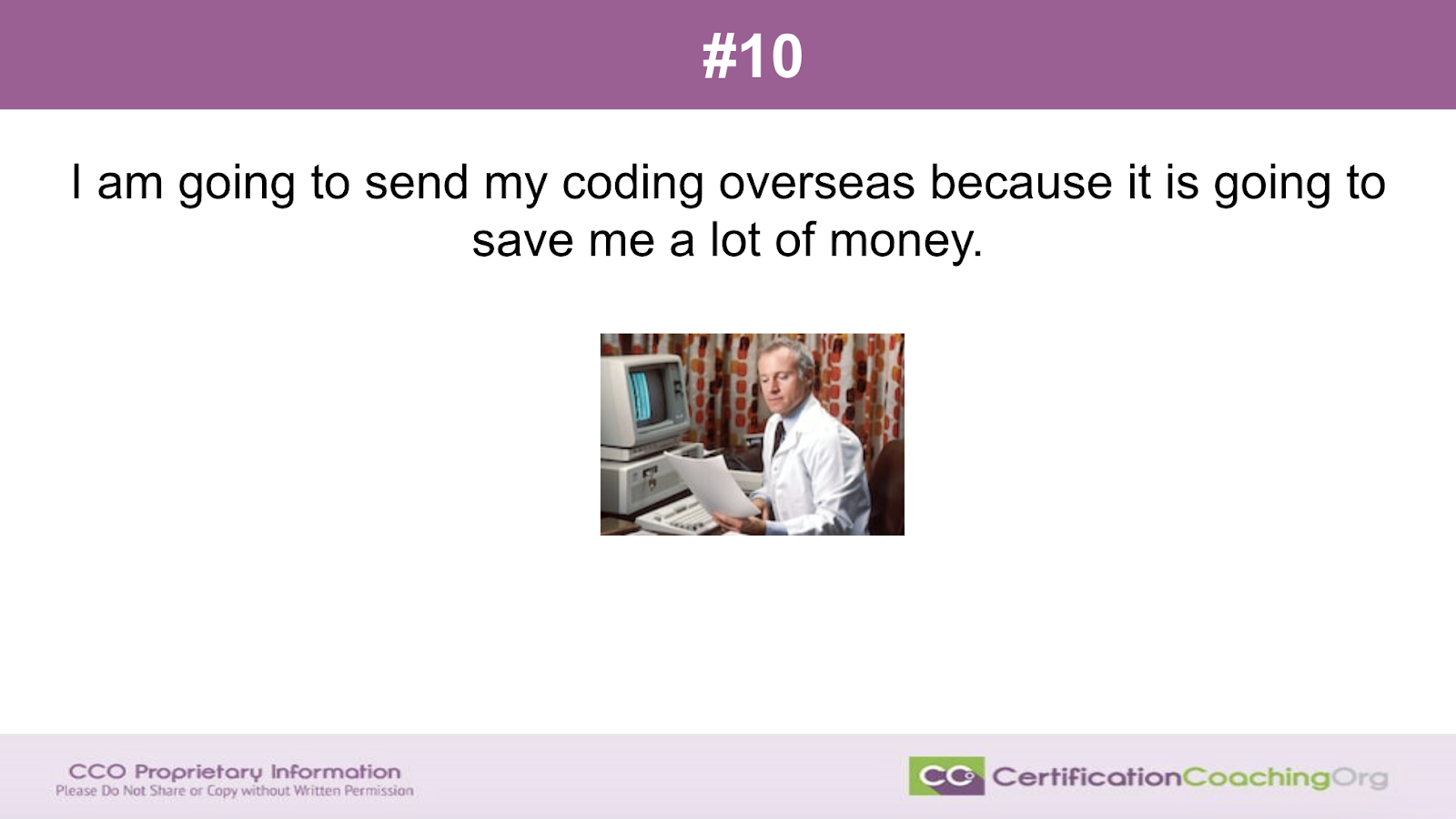
All right number 10. I’m going to send my coding overseas because it’s going to save me a lot of money. How many of you guys have heard that? Carmen says back in the days when I used to work for the Cardiology office. I had to go to the hospital to review the MRs and see auditors with medical records to check Doc’s notes. Yeah. That’s right. And sometimes, they’re paid outside sources. So, I do contract work where I go in as an outsider looking in which is beneficial a lot of times because not only do the providers get a little nose blind. But, so do the coders in the business office. She knows like it said they see this all the time and they’re scrambling to get everything done and stuff. And then, you have somebody like me come in and say oh guess what? I just saw a trend and it’s an easy fix. Let me tell you how to fix it. And this is what you need to do to make sure you don’t get in trouble in the future, etc. You have to have a fresh set of eyes on there.
So I’m going to send everything overseas. No. That is probably not the wisest of ideas. There are tons of articles on this. It doesn’t matter where you plan to send them. The fact is simple that once that data crosses the ocean, it’s not protected anymore even though they say it is. The people that are doing the audits could have credentials but other countries don’t hold testing standards to the level that we do. And so, if errors are being made you may not be fully aware of it. I know a lot of practices who went this route back sometime ago and they’re still paying off the repercussions of the errors that were made. They can’t be properly vetted who you’re sending them off to. So again, now if the entity, I’m not saying that everybody oversees is bad. I’m just saying that you can’t vet what’s going on overseas. And so, that would make me very worried and only because I’ve seen problems, too.
So, think twice about the benefits and the cost of having something overseas versus in-house or outsourced. So, outsourcing is different than sending it overseas to be done. There are a lot of fabulous legitimate and vetted billing and coding companies out there. And so, I would do some research and find a company. The great thing about billing and coding though is these companies can be anywhere in the United States. We all have variables considered offshore quotas that cost hospitals 3.10 or $3.10 per hour more than their American counterparts. That is a great fact. And so, you know, I always would be concerned when you hear about things going overseas. Nothing good seems to come of it ever. It may look on paper like it would be beneficial but it never is and you don’t have that communication or that relationship built up with those. Are they going to tell you about the trends and the mistakes? No, they’re just a drone popping in the numbers. And so, that also ends up being problematic I think but you did notice this picture that saved money and got that ancient computer. How many guys remember those? I know some of you are old enough to remember those.
Bonus That Is The Code The EMR Told Me To Use
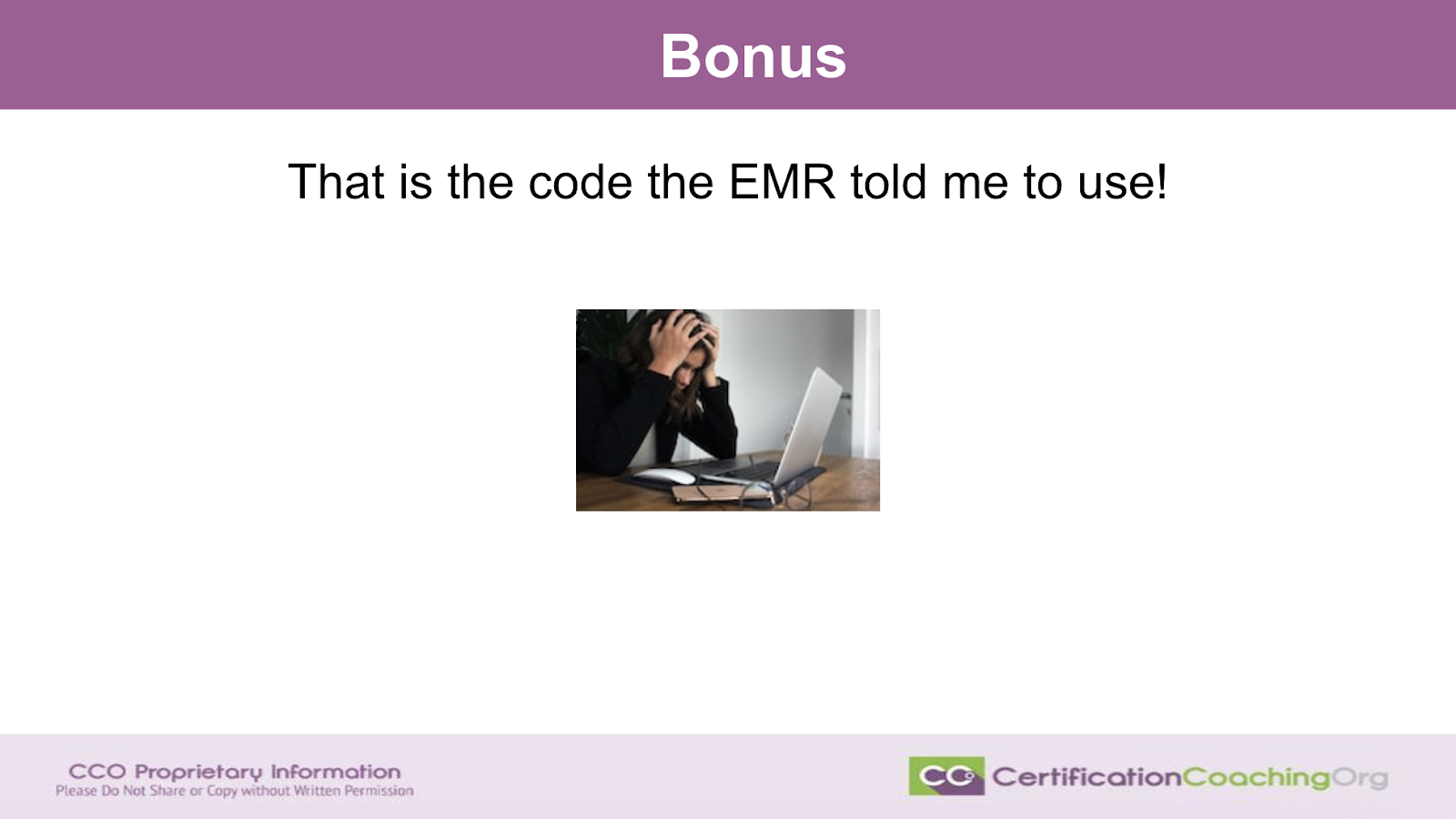
Hey, we got a bonus. A bonus one it is. That is the code the EMR told me to use. You hear this all the time, don’t you? And, I’m working with a group now at ACO and yeah you I’m doing all these audits and one of the things that I keep seeing is that it has the quote which is really nice because the A and P where they state the diagnosis it shows the code that was associated with it. So, the EMR set up like that which you know is kind of nice. But, what happened is that when they first got the system a long time ago, somebody was given the ability to go in and change the code description. So it isn’t the code description that’s in the book.
However, it is for example E11.59. It says type 2 diabetes with hypertension and then it says E11.59. Well, the provider thinks that it also codes hypertension at the same time and it doesn’t. E11.59, if with hypertension you have to code the hypertension. It’s not a causal relationship. It’s not a combo code. But, they think it is because the EMR stated it when they picked that code. That’s what it states. That’s all it has to do for the legal, you know, for it to be legal. Well, that’s right for the office visit but not the billing that when you bill it out you have to bill out E11.59 and you know, I10. You have to tell them what the actual verbiage is, type 2 diabetes with other circulatory complications. Well, what’s the other circulatory complication? You never stated and you never gave us or told us what it is. If it is because that statement that came up in the documentation isn’t the statement that goes to CMS.
And so therefore, we need to know what the other is and you have to also put in their hypertension in code that I10 in addition. The same thing if you’re going to link hyperlipidemia. That would be E11.69 and I’ll see this too, you know, a type 2 diabetes with hyperlipidemia or you know, hyperlipidemia affecting type 2 diabetes, duh duh duh, but you gotta still tell what type hyperlipidemia the patient has and there’s a whole lot of different types. But even if it’s unspecified, that still has to be put on the form, the 1500 form. Even though it states it in the documentation. Now, that is fine for the provider to have that statement in there. They did their job. If they know though that the code of that statement is not accurate, that was what was stated.
But if the coder knows, the coder has all the information that they need. Type 2 diabetes with hypertension. Well, they can go back and put the two codes in. But because they’re translating, they have the ability to understand the documentation’s right there. The provider needs to know that if any of that verbiage is being changed or has been changed, they don’t read the code set. They don’t know. We need to let them know. That is not an accurate statement. That is not what that code reads that it actually reads, you know, with other complications. And, there are other codes that are used with others in it and it states you have to specify what the other is and that’s the communication that we can give them. If they went in and changed any other code descriptions, maybe it isn’t about the other that they tweaked it and changed it completely. If they changed it and it doesn’t truly represent the code, that’s a problem too. Because now the document that they’re signing off is inaccurate and that can be a problem.
Very, very important for these EMR systems to verify every time, how often that you set it up that they are following the code set description and they haven’t been tweaked or changed by the entity that’s using them. The problem too is that back in the day when they were all forced to switch to EMR systems, they were scrambling and some of them waited until the last minute which was unfortunate. And so, they would have to dish out a lot of money for this. You know, it’s painful. But, they didn’t get that extra package for support, right. That cost even more. So, when that time ran out that came with the initial, they don’t know how to go in and make changes like this. So, then they have to find the IT person and the IT person doesn’t know. So, you know, it becomes difficult for everybody.
Don’t be messing with that code set. Our job is to translate for you. You stay what you want, you know, what is the diagnosis, what you’re doing in the procedures. We’ll tell you the information. We need to translate properly into the highest specificity, you know, laterality in there, mild, moderate, severe things like that. And then as long as you know what verbiage needs to be stated for specificity you’ll get less queries and you will also probably see your reimbursement go up because of the accuracy and the complexity being reflected in the codes. But don’t trust the EMR if it’s been around and people have been playing with it needs to be updated.
Renee says language barriers are a big problem with overseas companies, too. A conversation that a colleague had with one of those overseas companies was she was trying to correct them on an OP report or CPT trying to explain that they were interpreting the wrong part of the body. It was supposed to be the circle chronological procedure and they kept telling her no the cervix is in the neck. It’s the bones. I just talked about this the other day about why it’s important to understand the verbiage and the terminology because a lot of different body parts are named after each other, as well as being used in multiple parts of the body. Different ones and that’s exactly an example that I had given. Cervical is two places in the body and I can just see where English isn’t your first language and then you’re having to learn medical stuff on top of that. Mmm. Yeah, not good. So, thanks for sharing that Renee. That’s a good one.
Submit Your Topic Requests
All right guys. So, if you have topic requests that you’d like us to go over, it’s really easy to submit them. Go to https://www.cco.us/topic-request. We absolutely want to hear from you. It’s a lot of fun to do these live shows with CCOs especially if you have a topic that we know a lot of people struggle with. I love doing the research for it, especially if it’s a disease process ICD-10. Of course, I’ll do CPT if you make me. But, we want to be able to give you value and we want you to continue to come to us for answers. It makes us smarter as well. So, submit your topic requests.
![[CCO] Certification Coaching Organization LLC [CCO] Certification Coaching Organization LLC](https://www.cco.us/wp-content/uploads/2015/05/CCO-Logo-2015-d3-500px.png)
